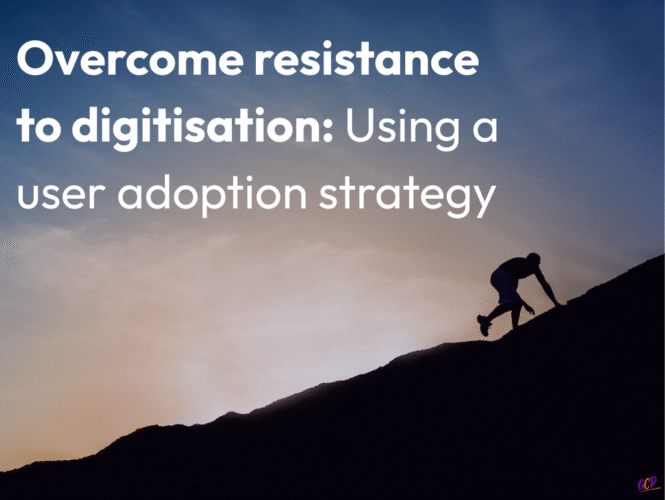In today’s rapidly evolving business landscape, digital transformation has become more than just a buzzword; it’s a necessity for staying competitive and relevant. However, despite the clear benefits of digitisation, many organisations face significant resistance when implementing change. Whether it’s fear of the unknown, reluctance to leave familiar processes behind, or concerns about job security, overcoming resistance to digitisation requires a strategic and empathetic approach to change management – placing people at the heart of it.
Understanding the Resistance:
Resistance to digitisation can manifest in various forms, from passive scepticism to outright refusal. Some employees may fear that new technologies will replace their roles or disrupt established workflows. Others may feel overwhelmed by the prospect of learning new systems or processes. Additionally, cultural factors within an organisation, such as established hierarchies or resistance to change, can worsen willingness to support digitisation efforts. Resistance will also be heightened in organisations where change fatigue is present, particularly where change efforts have been poorly managed in the past, leading to a lack of confidence in delivery.
Addressing Fear with Communication:
Effective communication is essential in addressing the fear and uncertainty that often accompanies digitisation efforts. Leaders must express a clear vision for why the change is necessary and how it aligns with the organisation’s goals and values. Transparent communication about the expected impact on roles and responsibilities can help alleviate concerns about job security and provide reassurance to employees. Face-to-face communication is always best wherever possible, but if you can’t get your sponsor there in person, try filming a video with them in advance! The personal touch goes a long way, particularly when addressing tenure concerns!
Involving Stakeholders in the Process:
Involving stakeholders in the digitisation process from the outset can foster a sense of ownership and buy-in. Seeking feedback from employees at all levels of the organisation can help identify potential pain points and opportunities for improvement. By actively involving stakeholders in decision-making and problem-solving, organisations can empower employees to become advocates for change rather than opponents.
Providing Training and Support:
One of the most common sources of resistance to digitisation is the perceived lack of skills or knowledge to adapt to new technologies. To address this challenge, organisations must invest in comprehensive training programmes to equip employees with the necessary skills to thrive in a digital environment. Providing ongoing support and resources, such as user-friendly guides and tutorials, can help relieve anxiety and build confidence in using new tools and systems. A well-crafted user adoption strategy can help ensure that employees are fully equipped to embrace new technologies. Good Change People can provide you with an approved, specifically appointed Change Management Consultant to help you navigate any complications, questions, and training that your employees might have. We put people at the heart of change, enabling you to achieve real value from your tools and increased user adoption!
Celebrating Small Wins:
Celebrating small wins along the digitisation journey can help maintain momentum and morale. Acknowledging and rewarding individuals and teams for their efforts and achievements can reinforce the positive impact of change and inspire continued engagement. By highlighting success stories and showcasing tangible results, organisations can demonstrate the value of digitisation and motivate employees to embrace further transformation.
Cultivating a Culture of Continuous Learning:
Digitisation is not a one-time event but an ongoing process of adaptation and innovation. Cultivating a culture of continuous learning, improvement, and experimentation is essential for staying agile and responsive to evolving technological trends. Encouraging a growth mindset and fostering a culture where failure is seen as an opportunity for learning can help mitigate resistance to change and foster a spirit of innovation within the organisation.
Conclusion:
Overcoming resistance to digitisation requires more than just implementing new technologies; it requires a comprehensive approach to change management that addresses the human element of transformation. By understanding the root causes of resistance, communicating effectively, involving stakeholders, providing training and support, celebrating successes, and fostering a culture of continuous learning, organisations can navigate the transition to digitisation successfully. Embracing change as an opportunity for growth and innovation, coupled with a strong user adoption strategy, can position organisations for long-term success in an increasingly digital world.





